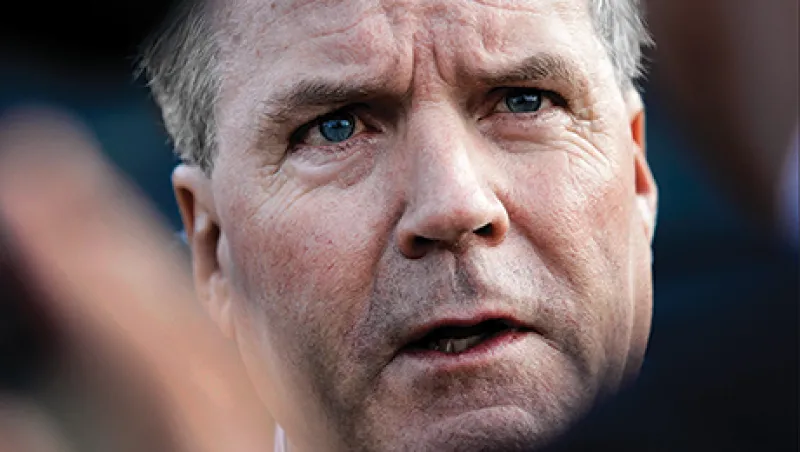Wall Street has had few friends in recent years, which made the emotional response to the passing of James Lee Jr. — JPMorgan Chase & Co.’s banker extraordinaire — all the more remarkable. It seemed as if every titan in business and finance knew Jimmy, as they all called him, and they had nothing but praise for a man they considered an innovative financier and a friend.
Lee was “a larger-than-life figure, the kind of person you could trust to do things,” says David Rubenstein, co-founder and co-CEO of Carlyle Group.
Jack Welch, the former General Electric Co. boss, remembers the JPMorgan vice chairman as “a fierce deal maker” who struck a chord with everyone from CEOs and hedge fund billionaires to office assistants and drivers. “He touched everybody. No one was too little or too big,” Welch says. “I just loved hanging around with him.”
Lee, 62, died of a heart attack after exercising at his home in Darien, Connecticut, in mid-June. His funeral at midtown Manhattan’s St. Patrick’s Cathedral was a state ceremony of sorts for Wall Street. Rubenstein and Welch were among 46 honorary ushers, a group that included Michael Bloomberg, Henry Kravis of KKR & Co., Stephen Schwarzman of Blackstone Group, Yahoo’s Marissa Mayer, Comcast Corp.’s Brian Roberts and New England Patriots owner Robert Kraft.
It was a fitting turnout for a man whose 40-year banking career practically defined the evolution of modern finance.
Lee joined Chemical Bank out of Williams College in 1975, helped start the firm’s syndicated loan business in the early 1980s, expanded into high-yield bonds after Chemical acquired Manufacturers Hanover Corp., then added an M&A practice in 1996 after Chemical merged with Chase Manhattan Corp. By combining the bank’s balance sheet and its ability to orchestrate large bond offers, he made Chase a one-stop shop for companies and private equity firms doing big deals. “That was really powerful,” says Andrew O’Brien, head of lending at JPMorgan’s investment bank, who had worked with Lee since 1992.
Lee was a relentless competitor who went the extra mile to win a client. He bought a Corvette to buttress his successful pitch for General Motors Co.’s $20.1 billion initial public offering in 2010 and learned magic tricks to win over founder Jack Ma ahead of Alibaba Group Holding’s $25 billion IPO last year.
When Steven Spielberg, Jeffrey Katzenberg and David Geffen formed DreamWorks Studios in 1994, Lee was one of the first to call, saying, “I want to help you guys build this business,” says Katzenberg. “He was really a mentor and a loyal supporter and believer unlike anybody else that does what he did for a living. It was always personal; it was never business.”
Rubenstein recalls how Lee took an interest in Carlyle from its early days in the 1980s because “he recognized that we might have a chance of getting somewhere.” When Carlyle went public in 2012, Lee personally pitched for the mandate, and won it. “He was so persistent for so long and so helpful, we thought that he deserved it,” says Rubenstein.
Welch, a senior adviser at Clayton, Dubilier & Rice, credits Lee with rescuing CDR’s $8.4 billion buyout of HD Supply, a distribution arm of Home Depot, when the early tremors of the financial crisis threatened to unravel the deal in 2007. “Everyone always felt they were getting the cards face up,” he says. “Everybody felt he had their best interests at heart.”
Most bankers call you when they have a deal to pitch, says David Bonderman, founder and managing partner of buyout firm TPG Capital, but “Jimmy was in contact all the time, whether you had something going with him or not.”
In 1994, as head of investment banking at Chase, Lee called Jamie Dimon out of the blue, deciding he needed to get to know the then-right-hand man to Sandy Weill at Travelers Group. After JPMorgan acquired Bank One Corp. in 2004 and Dimon became president and later CEO, the two formed one of the closest partnerships on Wall Street.
In his eulogy Dimon recounted how, after he was diagnosed with throat cancer last year, Lee would come into his office every day and give him a hug: “And you whispered in my ear, ‘I love you like a brother.’”
Although no one can replace Lee, JPMorgan’s top ranks are filled with executives who rose under his tutelage or worked closely with him, including asset management boss Mary Callahan Erdoes; Elizabeth Myers, head of global equity capital markets; Jennifer Nason, head of the technology, media and telecom banking group; and O’Brien. “You wanted to succeed for him; you wanted to get things done,” remembers O’Brien. He says Lee always stressed the importance of teamwork on a deal, telling colleagues, “It’s like Yankee Stadium here. There’s no name on the back of the jersey, just the name on the front — JPMorgan.”
This was a man who turned down an offer to be Schwarzman’s No. 2 in the early 2000s, which would have made him a billionaire, out of loyalty to JPMorgan and its then-CEO, William Harrison.
Lee was just as loyal to Williams, his alma mater, where he met his wife, Beth. He served as a trustee, owned a house just off the local golf course and sponsored the Lee Track (in memory of his days as a member of the school’s record-setting mile relay team) and the campus snack bar. He felt that “what mattered is that you were on a team, you could only achieve as part of a team: He thought those were really important lessons for students to learn at Williams,” says Adam Falk, the college president.
Many on Wall Street are now feeling the loss of someone they felt was part of their team. Daniel Loeb, founder and CEO of hedge fund firm Third Point, recalled how Lee had advised him to deliver a letter personally to Sony’s CEO when he took an activist stake in the Japanese company, and how Lee had bragged to him about his son’s acceptance into Columbia Business School. “With Jimmy’s passing, our community lost a little bit of its humanity, and I lost the closest thing I’ve had to a big brother,” he said.






